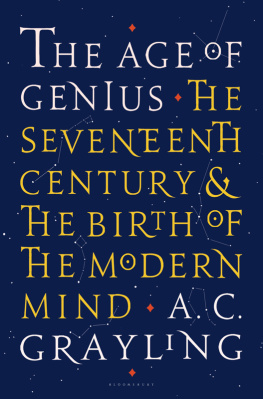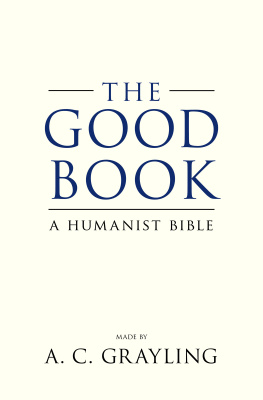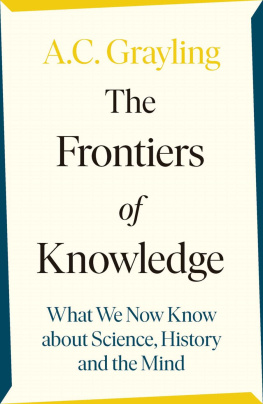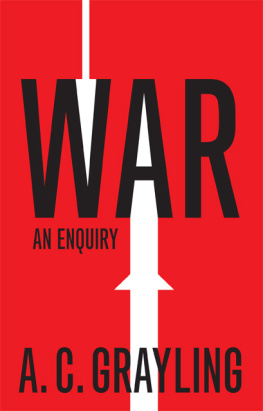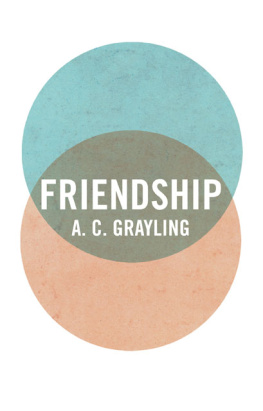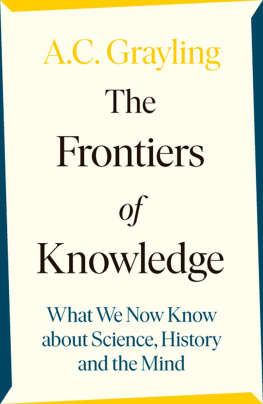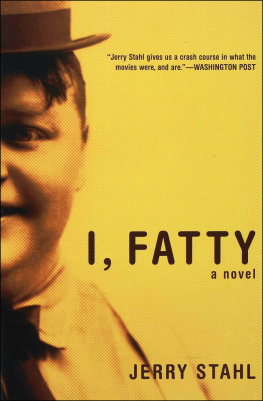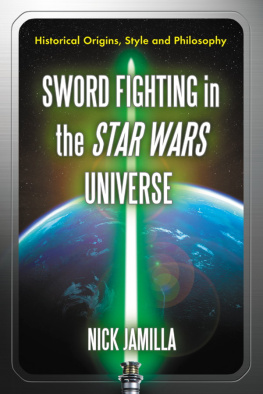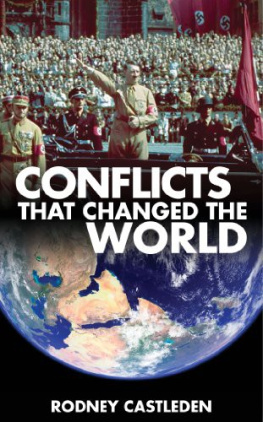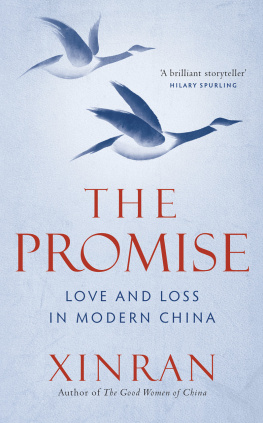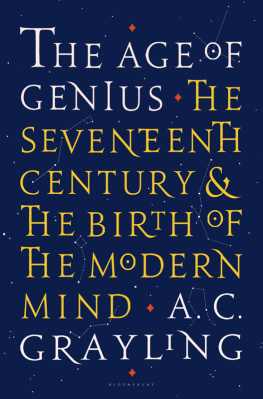THE AGE OF GENIUS
THE AGE OF
GENIUS
The Seventeenth Century and the Birth of the Modern Mind
A. C. Grayling

To the first graduating cohort of NCH: anima cultura gaudere
History is philosophy teaching by examples
Thucydides
Non est ad astra mollis e terris via
Seneca
CONTENTS

If you step outside on a warm clear night and look up, what do you see? Imagine answering this question 400 years ago. What did people see then, gazing at the stars? It is remarkable that in seeing the same thing we see today, they nevertheless saw a different universe with a completely different set of meanings both in itself and for their own personal lives. This marks a highly significant fact: that at the beginning of the seventeenth century the mind the mentality, the world-view of our best-educated and most thoughtful forebears was still fundamentally continuous with that of their own antique and medieval predecessors; but by the end of that century it had become modern. This striking fact means that the seventeenth century is a very special period in human history. It is in fact the epoch in the history of the human mind. In the pages to follow I support this large claim.
The seventeenth century is among the most extensively explored in the study of history. I enter this field with appropriate disclaimers therefore: my interest here is how to speak in the most general way the mind-set of the best-informed people in that century changed from being medieval to being modern in so short and tumultuous a time. To do this in a single book means selecting, sampling and surveying; there is no possibility of comprehensiveness. But seeing the pattern in a major movement of thought is like taking an aerial view of a landscape: one seeks out the larger contours, and because in explaining the seventeenth century the principal themes are science, philosophy and ideas, it is an arena where the philosopher and historian of ideas venture with propriety.
There is a polemical point to be made. The industry of historical scholarship requires periodic revisionism for its continuation, a good thing on the whole because it keeps debates alive and sends out fresh challenges to our understanding of the past and therefore the present too. One of the revisions offered to the thesis that the seventeenth century was the crucible of the modern is that it was not the crucible of the modern: the scientific revolution and the Enlightenment are no longer considered pivotal stages in the triumphant progress of scientific reason, and such developments are no longer seen as marking the decline of belief in the supernatural and the origin of the disenchantment of the world, writes a reviewer of a book about how belief in occultism persisted into the eighteenth century. Both reviewer and reviewed, and whoever no longer regards the period in question as being pivotal, fail to grasp a fundamental point: that yes of course superstition and the old beliefs persisted they still persist in many quarters but the revolution in world-view that occurred in the seventeenth century made them functionally marginal; where they had once been the central and dominating outlook of all minds, they began to move towards the sidelines of metaphysics and morals, and politics and international relations, as they moved also into the more private spaces of individual lives.

My interest in the intellectual history of the seventeenth century has been a long-standing one. Over the last twenty-five years, in a scholarly examination of the thought of George Berkeley (16851753), a biography of Ren Descartes (15981650), a book about concepts of freedom as they grew out of debates over liberty of conscience and enquiry in the sixteenth and seventeenth centuries, and in a number of essays about Locke, the scientific revolution and the following Enlightenment, I have come to think of the seventeenth century as especially significant. I claim that it is the epoch in the story of the human mind:itself apart in continuous warfare, amid insecurities and oppressions, with vertiginous new systems of thought challenging old certainties, it makes for a deeply absorbing as well as intriguing spectacle. And as always with important history, one learns much from it about ones own time and circumstances.
The puzzle of the seventeenth century is how the greatest ever change in the mental outlook of humanity could occur in the confusions of the time. Or is the answer to the puzzle in the puzzle itself? One aim, in this survey of that age of strife and genius, is to suggest an answer.

The mind of a time is the joint output of leading minds of the time, in the form of their debates, ideas and discoveries. The story of the seventeenth-century mind is accordingly the story of its leading minds and their interactions.
It is also the study of what made those interactions possible and often urgent. In hindsight we pigeonhole for our own convenience, and we overlook important details. We now talk of the scientific revolution, and differently we talk of philosophy in that period as shaping subsequent debate in epistemology, metaphysics and political theory, and thus we proceed as if the scientific and philosophical revolutions were not the same thing or rather, constituent parts of one larger thing. But they were indeed parts of each other and jointly of the greater mental revolution of the age.
Moreover, the revolution in question would not have been possible if it had not been possible for ideas to circulate, at least more freely than people could. So to understand how thought progressed in this period, we need to know about something seemingly so mundane as the postal services of the day. Significantly, there were several individuals who acted as so to speak internet servers connecting the savants of Europe to each other and facilitating the flow of information and exchange of ideas among them. One such was Marin Mersenne. His own varied work represents one of the signal features of the ages mental revolution, which was the effort to detach genuinely productive enquiry from the entanglements of mysticism, the occult, magic, Rosicrucianism and of course from the proscriptions of religion, which was threatened by sceptical questioning of its authority, and therefore hostile to the growth of secular knowledge and literacy.
Other commentators on the seventeenth century have picked out the growth of publications in vernacular languages, and the proliferation of Protestant sects some with their this-worldly focus on the blessings of material success (Protestantism and the rise of capitalism combines two well-known theses on this score) as among its transformative features, and the points are good. But it matters that they are put into yet broader context. Attitudes towards material conditions of life are effects of a change of mind about what is important; increased literacy and the proliferation of vernacular publications especially of pamphlets, satires, political tracts and news are among the causes. They, in turn, are among the vehicles by which ideas are transported from mind to mind: and ideas are the drivers of change.

